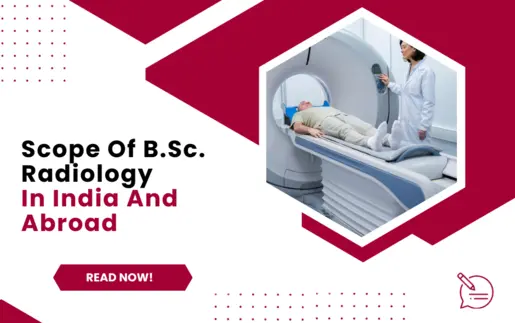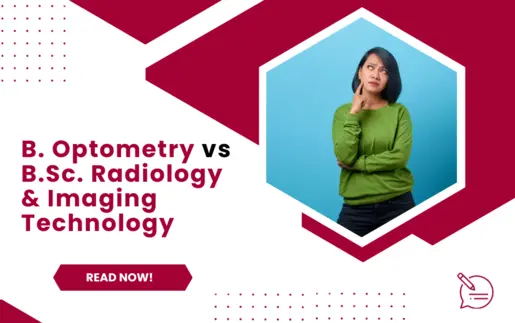Why is BSc Optometry in Such High Demand?
Why pursue a BSc in optometry?
Graduates of the BSc Optometry course have access to a broad range of professional options. They may work in various fields, including primary healthcare, business, the public sector, academia, and research.
Optometrists now evaluate patients and aid in diagnosing eye disorders, as opposed to the past, when their only responsibility was to fit eyeglasses. In addition to spectacles, the optometrist offers low-vision aids and contact lenses as corrective equipment. Optometrists provide primary medical treatment.
Practitioners often notice changes caused by illnesses like diabetes and arteriosclerosis first, which enables early diagnosis and treatment. Optometrists and ophthalmologists now collaborate on cases. General practice or specialties such as contact lenses, vision rehabilitation, orthotics, cognitive disabilities, pediatrics, and occupational vision are available to optometry students.
CGC Jhanjeri is the best BSC Optometry College in Chandigarh. The college has state-of-the-art infrastructure and well-equipped laboratories. The students can study recent research papers in the digital library.
Documents needed for Admission to the Bachelor of Optometry
- Class X- or XII-mark sheets
- Evidence of birthdate.
- Diploma from high school
- Transfer certificate
- Residence evidence a certificate or a domicile certificate
- Temporary certificate
- Character reference
- Certificates for Scheduled Caste, Scheduled Tribe, and Other Backward Caste
- Evidence of impairment (if any)
- Immigration Document
What qualifies someone for a BSc Optometry course?
Students who want to apply for admission to the BSc Optometry Course Details must meet the minimal eligibility requirements listed below:
The applicants must have earned the minimum marks in their 10+2 diploma from an accredited educational board.
The minimal score needed for BSc Optometry Course Details admission varies according to the institution. However, students must get at least 50% in the PCB, PCM, or PCMB categories.
Certain reputable institutions and institutes also hold entrance exams for those seeking admission to the degree program in BSc Optometry.
Candidates taking the 10+2 exams may also apply for this program. Still, they must provide their exam results during counseling (the Science track requires a minimum aggregate score of 50%). The final merit, or the total marks combined from the entrance test and the 10+2 final examinations, determines admission to the BSc Optometry program in institutions.
How should I prepare for the BSc Optometry Course Admission Exam?
Studying the most recent exam pattern and curriculum is among the most crucial measures for passing the entrance exam.
The key ideas to bear in mind while you study for the entrance exams are:
Students must dedicate at least two to three hours a day to reliable test preparation.
The most recent test questions should be used as a resource for the students, and by solving them, they will be able to comprehend both the course material and the most recent style of the entrance exam.
Students should take practice exams to learn about their flaws, strengths, and shortcomings.
Students should also have adequate time to concentrate on the revision; their performance may suffer if they work on the more vital areas and ignore the weaker sections.
For expert entrance exam eligibility, efficient time management is essential.
What follows a Bachelor of Optometry?
After earning a Bachelor of Optometry, many chances are available; all one must do is seize them. This is all due to the varied skill sets that each person has.
Graduates with a BSc Optometry course have many employment options. The students are qualified to be hired in different corporate and governmental sectors in pertinent fields.
They may work at factories that make lenses, optical shops, multinational businesses that sell eyecare items, etc. Optometrists, opticians, sales executives, teachers, eye doctors, etc. are a few examples of positions.
Optometrist:
An optometrist is a health care provider with expertise in the eyes who performs vision examinations, diagnoses problems based on the findings of those examinations, and then chooses the appropriate course of treatment for those disorders. After earning a Bachelor of Optometry, a salary of around INR 3.5 lakh is provided.
Optician:
A technician with training in correcting lenses for eye defects, advising patients on any required repairs or modifications, maintaining displays, and collaborating with sales representatives from vision care providers. They also check the prescription that an eye doctor has given. After earning a BSc in optometry, a salary of around INR 4 lakh is provided.
After earning a Bachelor of Optometry, sales professionals negotiate contracts, market consumer goods and services, and increase earnings. The promised pay is about INR 2.50 lakh.
Teacher:
A teacher's duties include creating lesson plans and curricula and delivering them to pupils one-on-one or in groups. They monitor their students' development and provide reports to let parents know how they are doing after receiving their BSc in Optometry. The promised salary is around INR 3.01 lakh.
After earning a Bachelor of Optometry, an optometrist researcher must investigate various eye conditions and how to cure them. The promised remuneration is about INR 5 lakh.
Admissions Open at CGC Jhanjeri
Admissions open for the BSc Optometry course at CGC Jhanjeri. Here, students learn about the anatomy of the eye. You will get more information about visual perception and common eye diseases. The Bachelor of Optometry covers optometric instrumentation, patient care, and management.



















